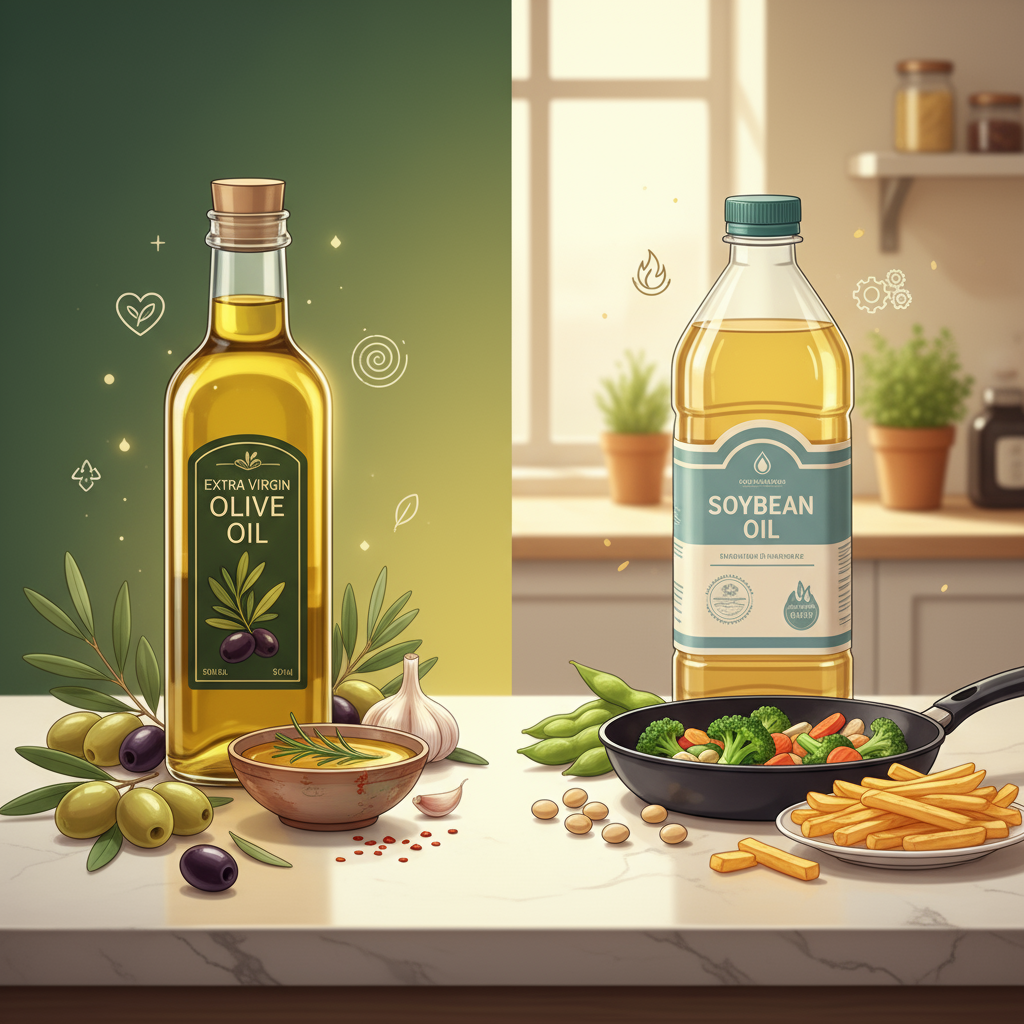
Olive Oil vs. Soybean Oil: Which is Healthier?
TL;DR
When comparing olive oil and soybean oil, olive oil, particularly extra virgin olive oil (EVOO), is generally considered the healthier option. EVOO is rich in monounsaturated fats, antioxidants, and anti-inflammatory properties, while soybean oil is often heavily processed and high in omega-6 fatty acids, which can contribute to inflammation and various health issues. For optimal health benefits, choose high-quality EVOO and use it in appropriate cooking methods.
Cooking oils play a crucial role in our diets, affecting both flavor and health. Among the most commonly used oils are olive oil and soybean oil. While both have their place in the kitchen, their nutritional profiles and health benefits differ significantly. This article explores the key differences between olive oil and soybean oil, helping you make an informed choice for your culinary needs.
Olive oil, particularly extra virgin olive oil (EVOO), has been celebrated for its health benefits for centuries. It is rich in monounsaturated fatty acids, which can help lower bad cholesterol levels and reduce the risk of heart disease. EVOO also contains antioxidants like vitamin E and polyphenols, which have anti-inflammatory properties and can help combat oxidative stress in the body.
Key Components of Olive Oil:
While olive oil can be used in various dishes, it is best suited for low to medium-heat cooking, salad dressings, and drizzling over vegetables. High temperatures can degrade its beneficial properties, so it’s advisable to avoid using EVOO for frying at high temperatures.
Soybean oil is one of the most widely consumed vegetable oils globally. It is often used in processed foods, salad dressings, and for frying due to its high smoke point and neutral flavor. However, soybean oil undergoes extensive refining processes that can strip away beneficial nutrients and introduce unhealthy byproducts.
Concerns with Soybean Oil:
Research indicates that diets high in soybean oil may contribute to metabolic disorders and inflammation. Studies have shown that excessive consumption can lead to gut dysbiosis and other health issues, making it less favorable compared to olive oil.
In the battle of olive oil vs. soybean oil, extra virgin olive oil clearly emerges as the healthier choice. Its rich nutritional profile, coupled with numerous health benefits, makes it a superior option for both cooking and drizzling over dishes. While soybean oil has its uses, particularly in high-heat applications, its potential health risks and lower nutritional value make it less desirable. For optimal health, prioritize high-quality olive oil in your diet.
Olive oil, especially extra virgin olive oil (EVOO), is rich in monounsaturated fats, antioxidants, and polyphenols. These components help lower bad cholesterol, reduce inflammation, and combat oxidative stress, promoting overall heart health.
Soybean oil is high in omega-6 fatty acids, which can contribute to inflammation when consumed in excess. Additionally, the extensive refining process it undergoes strips away beneficial nutrients, making it less nutritious compared to olive oil.
Olive oil is best used for low to medium-heat cooking, salad dressings, and drizzling over dishes. It is not recommended for high-temperature frying, as excessive heat can degrade its beneficial properties.
Yes, soybean oil has a high smoke point, making it suitable for frying and baking. However, due to its lower nutritional value and potential health risks, it is generally considered a less healthy option compared to olive oil.

How Burning Soybean Oil Can Make This Bus Go
TL;DR Soybean oil is a key ingredient in biodiesel, a cleaner-burning alternative to traditional diesel fuel. Buses powered by biodiesel, which can be made from soybean oil, produce significantly fewer emissions compared to conven...

Is Organic Soybean Oil Bad for You? A Comprehensive Guide
TL;DR Organic soybean oil is widely used in cooking and processed foods, but its health effects are debated. While it contains beneficial nutrients like vitamin K and omega-3 fatty acids, its high omega-6 content and potential for...

Is Soybean Oil Good for Skin? Exploring Its Benefits and Risks
TL;DR Soybean oil is a popular ingredient in skincare products due to its moisturizing, anti-inflammatory, and anti-aging properties. It is rich in essential fatty acids and vitamin E, making it beneficial for dry and irritated sk...

Is Soybean Oil Gluten-Free? A Comprehensive Guide
TL;DR Soybean oil, derived from soybeans, is naturally gluten-free and safe for individuals with gluten intolerance or celiac disease. While pure soybean oil contains no gluten, it is essential to check labels for any added ingred...
Ready to source an ingredient?
Whether you’re struggling to find the perfect ingredient, racing against the clock, or simply don’t have the bandwidth to manage sourcing — we’ve got your back.
Get a Free Sourcing AuditSavings is BIG but the relationship value is MASSIVE! Glad we met when we did. Looking forward to building this partnership with you and David.
Yohan, here to say you’re one of my favorite suppliers. Aside from your high quality ingredients, you’re so great to work with. Thanks for all the help you’ve given us this year.
Working with Global Savors and Yohan has been very smooth when sourcing ingredients. They offer a great selection and and cost savings! Yohan has been awesome to work with and we look forward to continuing business together.






Global Savors is your trusted partner for seamless ingredient sourcing, offering end-to-end solutions that streamline procurement, simplify logistics, and elevate your supply chain efficiency.
View More News
© 2026 Copyrights by Global Savors. All Rights Reserved

